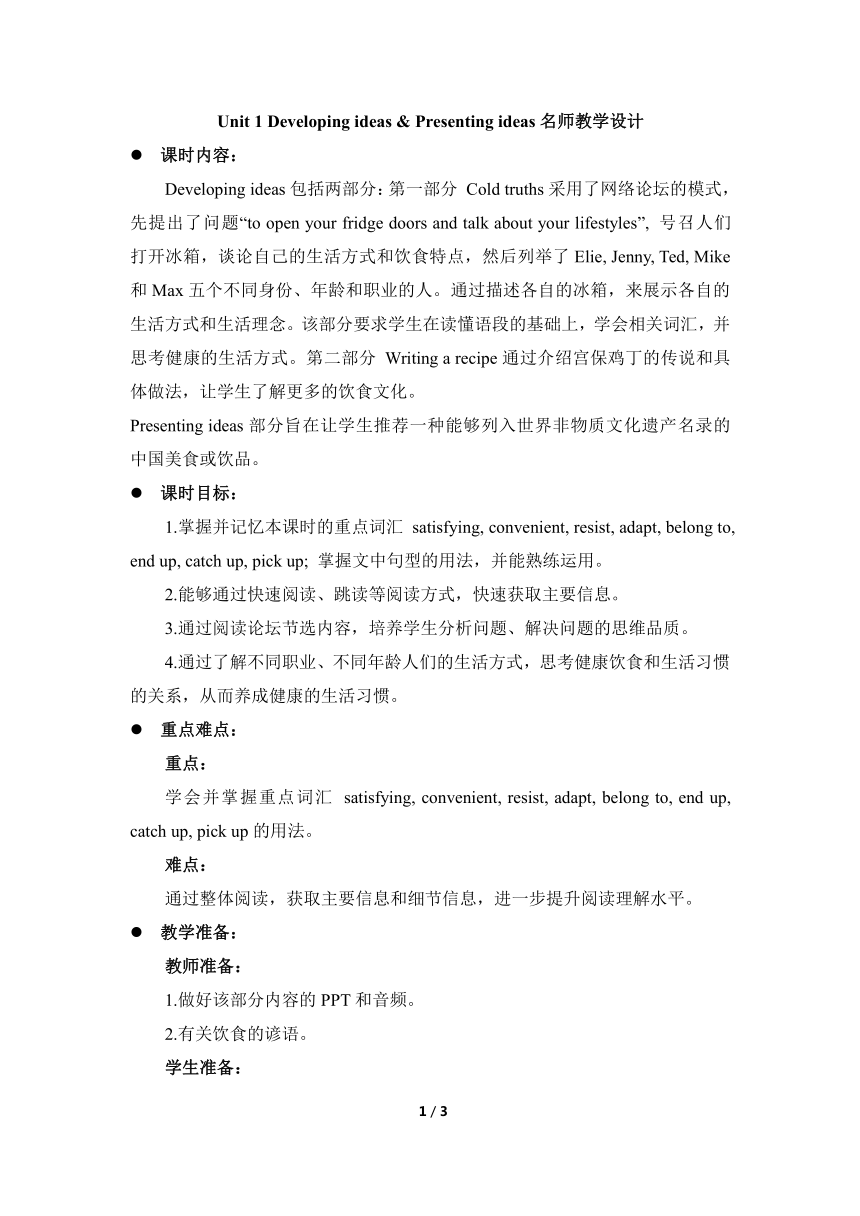外研版(2019)必修 第二册Unit 1 Food for thoughts Developing ideas & Presenting ideas名师教学设计
文档属性
| 名称 | 外研版(2019)必修 第二册Unit 1 Food for thoughts Developing ideas & Presenting ideas名师教学设计 |

|
|
| 格式 | docx | ||
| 文件大小 | 17.9KB | ||
| 资源类型 | 教案 | ||
| 版本资源 | 外研版(2019) | ||
| 科目 | 英语 | ||
| 更新时间 | 2023-02-26 16:54:29 | ||
图片预览

文档简介
Unit 1 Developing ideas & Presenting ideas名师教学设计
课时内容:
Developing ideas包括两部分:第一部分 Cold truths采用了网络论坛的模式,先提出了问题“to open your fridge doors and talk about your lifestyles”, 号召人们打开冰箱,谈论自己的生活方式和饮食特点,然后列举了Elie, Jenny, Ted, Mike和Max五个不同身份、年龄和职业的人。通过描述各自的冰箱,来展示各自的生活方式和生活理念。该部分要求学生在读懂语段的基础上,学会相关词汇,并思考健康的生活方式。第二部分 Writing a recipe通过介绍宫保鸡丁的传说和具体做法,让学生了解更多的饮食文化。
Presenting ideas部分旨在让学生推荐一种能够列入世界非物质文化遗产名录的中国美食或饮品。
课时目标:
1.掌握并记忆本课时的重点词汇 satisfying, convenient, resist, adapt, belong to, end up, catch up, pick up; 掌握文中句型的用法,并能熟练运用。
2.能够通过快速阅读、跳读等阅读方式,快速获取主要信息。
3.通过阅读论坛节选内容,培养学生分析问题、解决问题的思维品质。
4.通过了解不同职业、不同年龄人们的生活方式,思考健康饮食和生活习惯的关系,从而养成健康的生活习惯。
重点难点:
重点:
学会并掌握重点词汇 satisfying, convenient, resist, adapt, belong to, end up, catch up, pick up的用法。
难点:
通过整体阅读,获取主要信息和细节信息,进一步提升阅读理解水平。
教学准备:
教师准备:
1.做好该部分内容的PPT和音频。
2.有关饮食的谚语。
学生准备:
1.用简短的英语描述自己的生活方式和饮食特点。
2.上网查资料,了解不同地方的饮食文化。
教学过程:
Step I Lead-in
The teacher asks the students some questions.
(1)What does the proverb “You are what you eat.” mean
(2)Can you tell us your lifestyle and daily diet
【设计意图】通过简短的问答,引发学生的思考,让他们简述自己的生活方式和饮食特点,从而使后面的学习活动顺利进行。
Step II Reading
1.Fast reading
Read the passage on Page 9 and fill in the form.
Name Age Profession Lifestyle
Ellie
Jenny
Ted
Mike
Max
Keys:(略)
2.Careful reading
Read the passage again and make comments and suggestions about the lifestyle of each person in the passage.
Name Comments Suggestions
Ellie
Jenny
Ted
Mike
Max
Keys:(略)
【设计意图】通过设置这些阅读理解题目,让学生理清文章脉络,获取关键信息,进一步提高阅读理解的能力和水平。
3.Language points
Master the words and phrases: satisfying, convenient, resist, adapt, belong to, end up, catch up, pick up
【备注】知识点讲解详见第二教案。
Step III Homework
Review the language points learned in class.
板书设计:
Unit 1 Food for thought Period III Developing ideas & Presenting ideas I. Lead-in The teacher asks the students some questions. (1) What does the proverb “You are what you eat.” mean (2) Can you tell us your lifestyle and daily diet II. Reading 1. Fast reading 2. Careful reading 3. Language points Master the words and phrases satisfying, convenient, resist, adapt, belong to, end up, catch up, pick up III. Homework
2 / 2
课时内容:
Developing ideas包括两部分:第一部分 Cold truths采用了网络论坛的模式,先提出了问题“to open your fridge doors and talk about your lifestyles”, 号召人们打开冰箱,谈论自己的生活方式和饮食特点,然后列举了Elie, Jenny, Ted, Mike和Max五个不同身份、年龄和职业的人。通过描述各自的冰箱,来展示各自的生活方式和生活理念。该部分要求学生在读懂语段的基础上,学会相关词汇,并思考健康的生活方式。第二部分 Writing a recipe通过介绍宫保鸡丁的传说和具体做法,让学生了解更多的饮食文化。
Presenting ideas部分旨在让学生推荐一种能够列入世界非物质文化遗产名录的中国美食或饮品。
课时目标:
1.掌握并记忆本课时的重点词汇 satisfying, convenient, resist, adapt, belong to, end up, catch up, pick up; 掌握文中句型的用法,并能熟练运用。
2.能够通过快速阅读、跳读等阅读方式,快速获取主要信息。
3.通过阅读论坛节选内容,培养学生分析问题、解决问题的思维品质。
4.通过了解不同职业、不同年龄人们的生活方式,思考健康饮食和生活习惯的关系,从而养成健康的生活习惯。
重点难点:
重点:
学会并掌握重点词汇 satisfying, convenient, resist, adapt, belong to, end up, catch up, pick up的用法。
难点:
通过整体阅读,获取主要信息和细节信息,进一步提升阅读理解水平。
教学准备:
教师准备:
1.做好该部分内容的PPT和音频。
2.有关饮食的谚语。
学生准备:
1.用简短的英语描述自己的生活方式和饮食特点。
2.上网查资料,了解不同地方的饮食文化。
教学过程:
Step I Lead-in
The teacher asks the students some questions.
(1)What does the proverb “You are what you eat.” mean
(2)Can you tell us your lifestyle and daily diet
【设计意图】通过简短的问答,引发学生的思考,让他们简述自己的生活方式和饮食特点,从而使后面的学习活动顺利进行。
Step II Reading
1.Fast reading
Read the passage on Page 9 and fill in the form.
Name Age Profession Lifestyle
Ellie
Jenny
Ted
Mike
Max
Keys:(略)
2.Careful reading
Read the passage again and make comments and suggestions about the lifestyle of each person in the passage.
Name Comments Suggestions
Ellie
Jenny
Ted
Mike
Max
Keys:(略)
【设计意图】通过设置这些阅读理解题目,让学生理清文章脉络,获取关键信息,进一步提高阅读理解的能力和水平。
3.Language points
Master the words and phrases: satisfying, convenient, resist, adapt, belong to, end up, catch up, pick up
【备注】知识点讲解详见第二教案。
Step III Homework
Review the language points learned in class.
板书设计:
Unit 1 Food for thought Period III Developing ideas & Presenting ideas I. Lead-in The teacher asks the students some questions. (1) What does the proverb “You are what you eat.” mean (2) Can you tell us your lifestyle and daily diet II. Reading 1. Fast reading 2. Careful reading 3. Language points Master the words and phrases satisfying, convenient, resist, adapt, belong to, end up, catch up, pick up III. Homework
2 / 2
